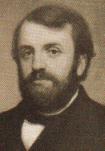Heroes of the Faith
Concise stories of significant Christian leaders
Concise stories of significant Christian leaders

 Dwight L Moody
Dwight L Moody1837-
———————————————————————
D.L. Moody was the fifth son of a smallholder and mason in Northfield, Massachusetts. His father died of too much whiskey when D.L. was four. The family of eight was reared in poverty by its strong©willed mother, and Moody's education was erratic because he was needed on the farm. He disliked farming, and at seventeen he went to Boston to take a job in a shoe store run by his uncles.
In the Sunday School of their Boston church, D.L. came to a very definite conversion to Christ on April 21, 1855.
Moody was well built, a hard worker, ambitious and full of fun. In 1856 he migrated to Chicago and soon found work in a shoe store. Here he became more and more absorbed in Christian work among the roughest boys and girls in Chicago's slums. At first he felt himself too uneducated to preach or teach, but soon developed a breezy gift of making the Bible come alive.
His desire to win souls became so strong that in 1860 he gave up his business career to run his children's mission, and the new YMCA, without salary. During the Civil War he served as a lay chaplain. He was never ordained. By 1865, he had become a highly effective homespun evangelist, ridiculed in Chicago as "Crazy Moody."
In 1862 he married Emma Revell. They had two sons and a daughter. His happy home life gave him a firm base for his work and travels.
In 1870 Moody met Ira D. Sankey, a young civil servant with an untrained but very fine voice. Moody persuaded Sankey to join him to lead the singing at the independent church on Chicago Avenue which had grown up around his mission in the city's slums. In October 1871 a great fire destroyed Chicago and all that Moody had built up there. While in New York that winter to raise funds to rebuild the churches, he underwent a profound spiritual renewal. In 1872 he visited Britain briefly. He had not intended to preach, but his effectiveness and freshness led to three independent invitations to return for a prolonged mission. It was on this visit also that he heard an ex-butcher, Henry Varley, remark, "The world has yet to see what God will do with a man fully consecrated to him." Moody resolved to be that man.
In June 1873 Moody and Sankey landed in Liverpool, England, to find no arrangements, organisation or funds. They therefore took up a half©answered invitation to York, where they began an entirely unprepared mission in a most unlikely city, with such success that they were invited to the great industrial town of Newcastle.
The real breakthrough came in Edinburgh where Moody's unconventional preaching and Sankey's singing reached right to the heart of the people. All Scotland was stirred by Moody and Sankey during 1874; their own evangelism inspired many lesser campaigns. Moody developed the "after meeting" or enquiry room, worked closely with the churches, and emphasised the need for pastoral care of converts. His strong social concern sparked off new movements for the relief of distress and for the bodily and spiritual welfare of the young.
The British campaign reached its climax in London from March to July 1875. Moody and Sankey reached poor and rich alike and brought thousands to Christ.
The United States now opened up, and Moody and Sankey campaigns took place during the later 1870s and after. Clergy and laity of many denominations cooperated in preparation and follow-up.
The proceeds of the vast sale of Sacred Songs and Solos were put into a trust fund, out of which were founded the Northfield School for girls who were too poor to obtain good education (1879), followed by Mount Hermon (1881) for boys.
From 1882-1884 the evangelists were again in Britain. By the end of the second London campaign the aged Lord Shaftesbury spoke of an unprecedented movement among the very poor "towards a knowledge of the Word of God." Moody also held a campaign in Cambridge University. A direct result was the "Cambridge Seven," seven young men of wealth, social position and athletic prowess who gave up their careers and sailed in 1885 to be missionaries in China.
In 1886 Moody founded the Moody Bible Institute in Chicago to train young men and women for full©time Christian service.
Despite heart trouble in his later years, Moody refused to let up. He was taken ill during a campaign at Kansas city in November 1899 and died on December 22 at the age of sixty-two. Moody had done a great deal for the Christian cause in his own generation and had recruited for Christ many who were leaders in the next.